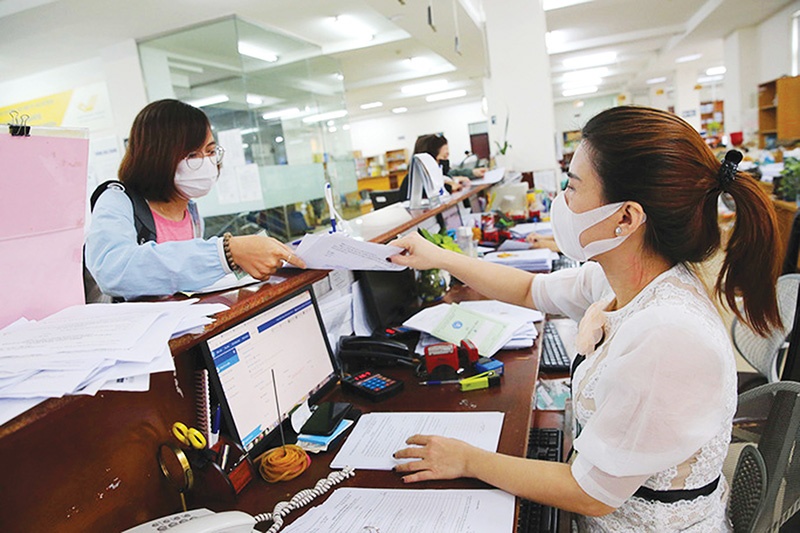Associations seek more insurance-led assistance
 |
| Many smaller companies are struggling to keep up with insurance payments while halting production. Photo: Le Toan |
Nguyen Khanh Trinh, chairman of digital advertising service provider CleverGroup, has voiced his impatience about insurance expenses. “CleverGroup has branches in Hanoi, Danang, and Ho Chi Minh City but despite all employees having to suspend work, the company still pays full premiums of social insurance, health insurance, and unemployment insurance for them," Trinh said.
These premiums cost CleverGroup thousands of US dollars. "If a small- or medium-sized group like us cannot arrange the cash flow for at least three months in advance, they may go bankrupt,” Trinh said.
“The problem is that businesses have to pay full fees for insurance, and they will be fined for delays in payment, while employees having to temporarily stop work due to the pandemic are not receiving unemployment insurance,” he added.
CleverGroup is just one example. Last week, 11 business associations sent a document to Deputy Prime Minister Le Minh Khai to request that he arranges a working session with the task force set up to remove difficulties for the business community and the labour force during the pandemic. The associations also sent proposals relating to the usage of social insurance and unemployment insurance funds.
According to the associations, businesses are suffering from disruption of raw material supply, loss of customers, market share, and a large shortage of labour resources. However, they still have to pay salaries, insurance premiums, and union fees in full.
Nguyen Chanh Phuong, vice chairman of the Handicraft and Wood Industry Association of Ho Chi Minh City (HAWA) told VIR, “The 11 associations are mostly located in the southern region, which is suffering the most serious pandemic damage, and they have a large labour force, driving expenditures sky-high.”
In the handicraft and wood industry, the expenditures for employees make up 15-20 per cent of the products’ selling prices. “Meanwhile, employers are running out of cash due to cancelled orders or stuck deliveries. Overall, the total capacity of businesses has seen a drop of 70 per cent in this pandemic situation,” Phuong added.
The pressure will continue to increase in Ho Chi Minh City after local authorities decided to extend the social distancing policy until the end of September at least. In this light, the 14 associations are also seeking a meeting with the relevant task force so representatives can present proposals and recommendations to help them overcome difficulties.
At the same time, the associations require the deputy prime minister to ask Vietnam Social Security (VSS) to consider a number of urgent issues. Notably, they want VSS to fully exempt social insurance premiums for businesses which have to either suspend operations or implement social distancing policies as required by the government.
Regarding those maintaining a stay-at-work manufacturing model, it is necessary to reduce social insurance premiums by 50 per cent for six months. In addition, VSS should not issue fines for employers not able to pay social insurance premiums because they are in lockdown areas, or have had to suspend operations or suffer from low capacity.
Meanwhile, the associations propose that employees who have to halt their job due to isolation or because their companies cannot implement a stay-at-work model should be entitled to 75 per cent of their salary calculated for social insurance payments. This incentive is equal to the payment for illness mentioned in the Law on Social Insurance during social distancing measures.
According to the government’s report, as of the end of 2020, the total balance of the social insurance and unemployment insurance fund was estimated at just over $40.6 billion, of which the balances are transferred to 2021 are sickness and maternity funds ($552.17 million), the insurance fund for occupational accidents and diseases ($2.33 billion), unemployment insurance fund ($3.78 billion), and the pension and survivorship fund ($34.3 billion).
Phuong of HAWA added, “We know that it will take a long time for the authorities to consider and deal with the above proposals, thus we expect that the authorities will give priority to dealing with proposals relating to exemption or reduction of social insurance premiums.”
| In July, the prime minister issued Decision No.23/2021/QD-TTg on the implementation of policies to support employees and employers in difficulty due to the ongoing pandemic. The reduction is applied between July 2021 and June 2022. Most employers are entitled to apply the insurance payment reduction from this policy, except for cadres, civil servants, public employees, people in the armed forces, employees in agencies of the Party and state, administrative agencies, and public non-business units which receive salaries from the state budget. Employers support the entire amount of money from the reduction of the above premium for employees. Businesses established after July 1 will also benefit from this package. The latest figures show that more than a week after the decision was approved, more than 11.2 million employees working at around 375,000 businesses in the country received a reduction in their insurance premiums for occupational accidents and diseases, worth about VND4.3 trillion ($187 million). Ho Chi Minh City takes the biggest share with over 2.3 million employees, working at over 101,300 businesses, who received total financial support of over VND1 trillion ($43.5 million) through the government’s support package. Approximately 1.4 million employees working at over 87,000 businesses in the capital of Hanoi received total financial support of over VND640 billion ($27.8 million). Nearly 11,000 businesses with more than 750,000 employees in Dong Nai also received financial support of over VND330 billion ($14.3 million). Additionally, employees in the cities and provinces of Binh Duong, Haiphong, Bac Ninh, Nghe An, Danang, Hai Duong, and Quang Ninh also received large amounts in support. |
| Hoang Thi Na Huong - General director, Protec Helmets
Although we agree that businesses need to be more proactive in planning production and business, we were completely unprepared because the social distancing order was issued at midnight on July 24. Domestic manufacturers are facing challenges caused by the pandemic such as high operating costs, a production brought to a standstill, and other economic problems, including the risk of closure. The current wave broke out right after our factory had just been relocated to Vinh Phuc province, with us meeting many difficulties in pandemic prevention and control. In the context of the prolonged pandemic, stagnant business activities and high costs due to transportation difficulties, we are hustling to survive and maintain a basic income for our employees. I think it’s time for the government to support businesses and consider the exemption of social insurance premiums during the social distancing period, with a timely policy to allocate resources for COVID-19 testing for employees when they have to work in other provinces. Testing costs are becoming a burden for businesses as we have to test every three days for hundreds of employees travelling between Hanoi and Vinh Phuc – a big concern. We hope the government will reduce the insurance premium by at least 50 per cent for businesses and allow us to use the maternity and sickness funds to cover the costs of testing. Cuong Nguyen - Founder, C-Brewmaster Brewery
Like many other businesses, the four outlets of C-Brewmaster in Hanoi and Ho Chi Minh City have been forced to close. Two breweries in Tien Giang and Hanoi are just operating in moderation to maintain the brewing system. We have been implementing the stay-at-work model for the past few weeks to maintain production, but operating costs are too high and the efficiency is low. Sales are also very slow, and our business is suffering heavy losses. Meanwhile, transportation and distribution are also facing many difficulties. Although our revenues are very low, we have not had any production costs reduced during the social distancing. Every month, we still have to spend thousands of US dollars paying rent, electricity, salaries, and social security contributions. In order to save businesses, Vietnam could immediately deploy three solutions that are applied by other countries. The first is to extend the time to pay VAT and social security contributions, as well as reduce taxes until the economy recovers, which is expected around the end of 2022. Next would be to reduce lending interest rates and create opportunities for businesses to borrow at deposit rates, including to defer repayments of the loan principal and interest to banks until the third quarter of 2022. Lastly, another solution would be to give each business a preferential loan from the national fund for three months of operating costs to restore both production and business. |
What the stars mean:
★ Poor ★ ★ Promising ★★★ Good ★★★★ Very good ★★★★★ Exceptional
Themes: Together We Win
- Greater Mekong Subregion executives to discuss sustainable tourism
- TCPVN donates 1,200 medicine bags to COVID-19 patients in southwest
- AB InBev supports orphans with scholarships amid COVID-19
- Evaluating the reach of support in turbulent times
- Gamuda Land grants “Back to School” scholarships to support disadvantaged students
Related Contents
Latest News
More News
- State corporations poised to drive 2026 growth (February 03, 2026 | 13:58)
- Why high-tech talent will define Vietnam’s growth (February 02, 2026 | 10:47)
- FMCG resilience amid varying storms (February 02, 2026 | 10:00)
- Customs reforms strengthen business confidence, support trade growth (February 01, 2026 | 08:20)
- Vietnam and US to launch sixth trade negotiation round (January 30, 2026 | 15:19)
- Digital publishing emerges as key growth driver in Vietnam (January 30, 2026 | 10:59)
- EVN signs key contract for Tri An hydropower expansion (January 30, 2026 | 10:57)
- Vietnam to lead trade growth in ASEAN (January 29, 2026 | 15:08)
- Carlsberg Vietnam delivers Lunar New Year support in central region (January 28, 2026 | 17:19)
- TikTok penalised $35,000 in Vietnam for consumer protection violations (January 28, 2026 | 17:15)



 Tag:
Tag:




















 Mobile Version
Mobile Version